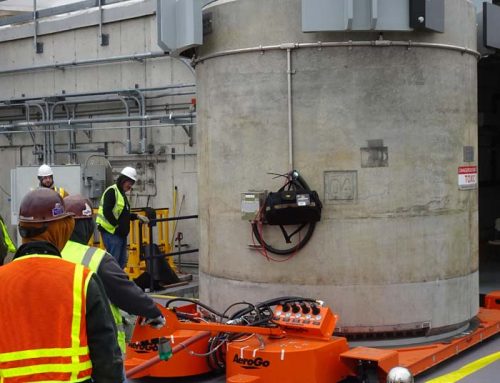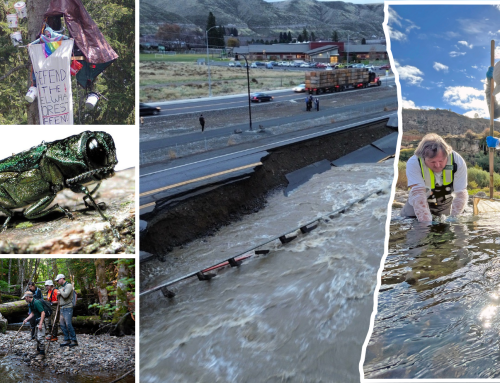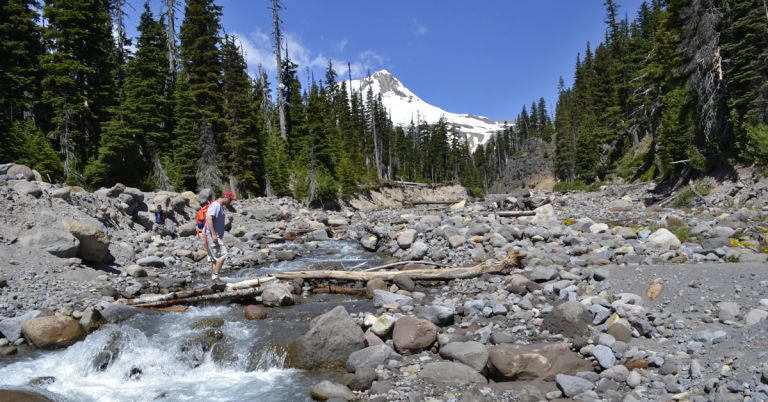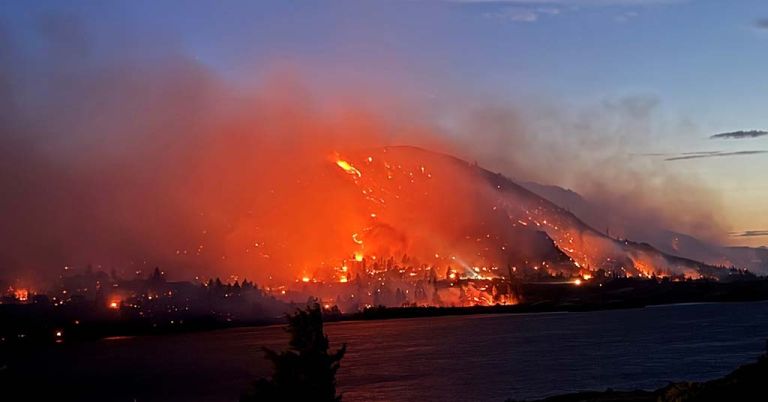This is a follow-up on an article that Columbia Insight published in December, 2018: Quarry in Washougal incites quarrel over land use regulations
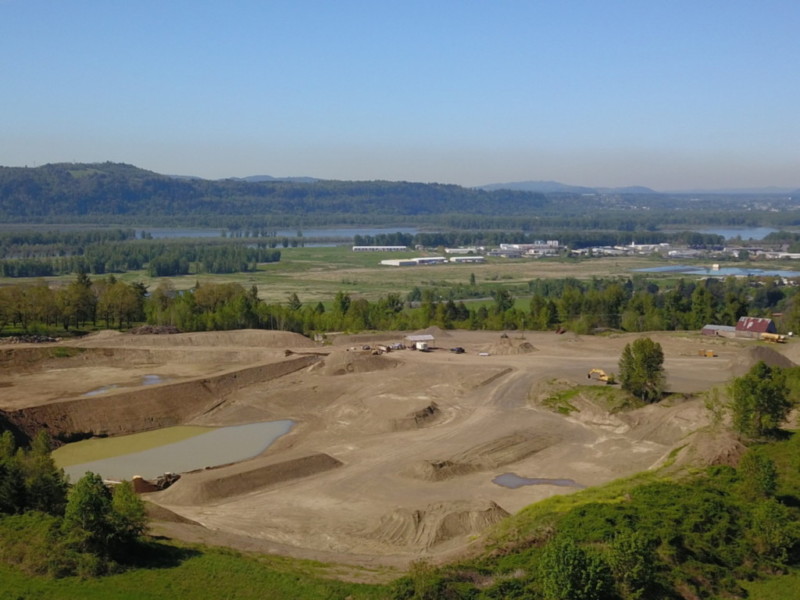
An aerial view of the Washougal Rock Pit, which is located just within the western boundary of the Columbia River Gorge National Scenic Area. Photo courtesy of Friends of the Gorge
By Dac Collins. Sept. 5, 2019. Jody Akers was one of a number of Washougal residents who felt vindicated by a ruling that the Gorge Commission handed down on Aug. 13. That ruling reversed a decision made by Clark County Hearings Examiner Joe Turner the previous August, which allowed mining operations to continue at the Washougal Rock Pit.
“Initially, I thought, ‘Yay, we’ve made some headway,’ and that some things would change,” Akers says.
But soon after the Gorge Commission determined (by a vote of 10-1) that the rock pit was operating illegally, Akers and the other private landowners living near the quarry noticed that the “illegal” mine was not only still operational…it was moving even more gravel than before.
“It seemed to me like the next day after that ruling came, we actually noticed an increase in traffic,” Akers explains. “It was kinda like, ‘Oh man, they’re going to town because whatever they’re doing, they want to get as much done as they possibly can before they might be shut down.’ That’s what I noticed. And I work from home so I am here quite a bit of the time. ”
“A Pyrrhic victory”
Nathan Baker is the Senior Staff Attorney for Friends of the Columbia Gorge, an environmental advocacy and watchdog group based in nearby Portland. Along with attorney Gary Kahn, who represents Akers and the other affected neighbors, Baker has been directly involved in litigation against the landowner, Judith Zimmerly, and the Vancouver-based Nutter Corporation that is operating the quarry.
Baker says that aside from the inherent risk that the rock pit poses to public safety and the environmentally sensitive areas of nearby Gibbons Creek and Steigerwald Wildlife Refuge, the quarry has been operating without the proper permits since October of 2017. For this reason, he refers to the Washougal Rock Pit as “the largest ongoing land use violation in the history of the National Scenic Area.”
And referring to the Aug. 13 hearing, Baker says: “In one sense it’s a Pyrrhic victory. Because even though the mining has been deemed illegal, the government entities with enforcement powers, including the Gorge Commission’s Executive Director and Clark County, have not stepped up and enforced.”
In light of this alleged inaction, Friends of the Gorge joined Akers and the other disgruntled neighbors in filing a new motion on Aug. 29. It asks the Gorge Commissioners to issue an injunction prohibiting Nutter and Zimmerly from conducting any further mining (or related activities) unless or until a valid Scenic Area permit is obtained.
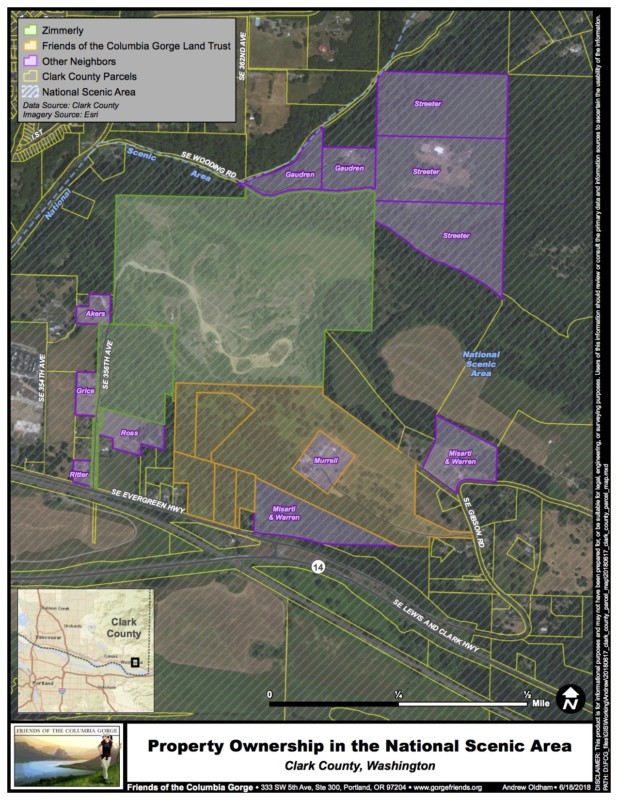
This map shows the property locations for the neighbors currently seeking an injunction against the un-permitted rock pit. Map courtesy of Friends of the Gorge
In a declaration supporting that motion, Akers writes: “Despite the decision of the Gorge Commission on Aug. 13, 2019, the mining and related violations on the property have continued since that date. Six days per week (every day except Sunday), in both the morning and afternoon, the mining activities have continued, and the mining trucks have continued to haul mined material from the Zimmerly property, past my property.”
“I do not understand how or why the violations are being allowed to continue, even after a ruling that the mining is illegal,” Akers continues.
This is certainly a valid concern. But as it stands now, there seems to be a major disagreement over who should be responsible for enforcing the Gorge Commission’s decision.
Whose court is the ball in?
Baker argues that the Gorge Commission “has much stronger powers than Clark County does for enforcement.”
Furthermore, he says the Commission has a mandate to enforce the rules of the Columbia River Gorge National Scenic Area, which were established to protect the scenic, cultural, recreational and natural resources of the Gorge.
“Unfortunately the Gorge Commission staff have not been complying with that mandate,” Baker says. And he points to language from the Gorge Commission’s enforcement rules authorizing the Commission’s Director to issue a stop-work order:
[perfectpullquote align=”full” bordertop=”false” cite=”” link=”” color=”” class=”” size=””]“Where an imminent threat exists to resources protected under the law and/or to public health, safety or welfare, the Director may issue a summary order requiring the alleged violator to promptly stop work or take other necessary action pending a notice of alleged violation.”[/perfectpullquote]
But the Executive Director of the Gorge Commission, Krystyna Wolniakowski, disagrees with Baker’s interpretation of the rules. She explains that when they decided to reverse the finding of the Clark County Hearing Examiner on Aug. 13, the Commission effectively put the ball back in Clark County’s court because the county administers the ordinance for permitting in the National Scenic Area.
Explaining that the Commission serves as a “neutral appellate body” when someone files an appeal to the Commission, Wolniakowski says: “That’s what the Gorge Commission’s role is, and that’s what we did.”
Now, she says, it is up to Clark County to work with Zimmerly and the Nutter Corporation in order to issue a new permit, which is required to bring the rock pit into compliance.
“This is the type of relationship that we have with all five counties in the Gorge that have adopted the NSA management plan into their ordinances,” she continues.
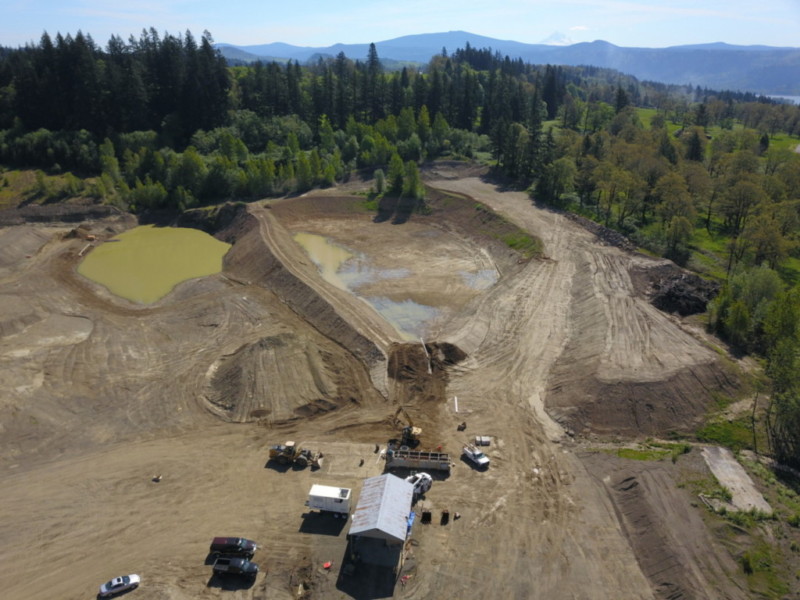
Drone photography shows that the operators have constructed two new mining reservoirs over the past few months, heightening concerns that the quarry could have adverse effects on nearby Gibbons Creek and Steigerwald Wildlife Refuge. Photo courtesy of Friends of the Gorge
Clark County officials, however, seem to be in no rush to issue a stop-work order or file any sort of injunction against Zimmerly and the Nutter Corporation.
According to Clark County’s Community Development Director Mitch Nickolds: “It’s not known whether they have applied for a new permit or not, but it is our hope that an application is on its way at this time.”
Nickolds says that the county has not taken any immediate action on the Gorge Commission’s recent decision because “there’s a lot of decisions yet to be made here.”
“This is a very large, very cumbersome, very challenging set of circumstances,” Nickolds explains. “And you cannot rush into something this substantial in a hurry. Making haste can be problematic.”
Next steps
This practical explanation doesn’t sit well with Baker, Akers and the other neighbors. They believe that unless there are significant governmental enforcement actions taken against the property owner and the operators of the rock pit, the two parties will continue to blatantly disregard the regulations of the National Scenic Area just as they have for the past 23 months.
“It’s essential that the mining stops immediately,” Baker says. “Mining is an allowed use in this zone, and Friends’ goal is not to stop mining at this site forever. We recognize that it is an allowed use. But it can’t be completely unregulated as it is now.”
Neither Zimmerly nor the Nutter Corporation responded to requests for comment, but Wolniakowski has a simple and straightforward message for Zimmerly and the Nutter Corporation.
“They should pro-actively engage with the neighbors and agree on the safest way to operate in the neighborhood, while working quickly with Clark County to get their permit to operate and be in compliance with NSA rules and the Commission’s decision.”
Regarding the next steps, Wolniakowski says that Jeffrey Litwak, the Gorge Commission’s attorney, will draft a written Final Order of the Commission’s Aug. 13 decision by Nov. 12. After that, anyone who wants to challenge the Commission’s written decision can file an appeal within 60 days.


